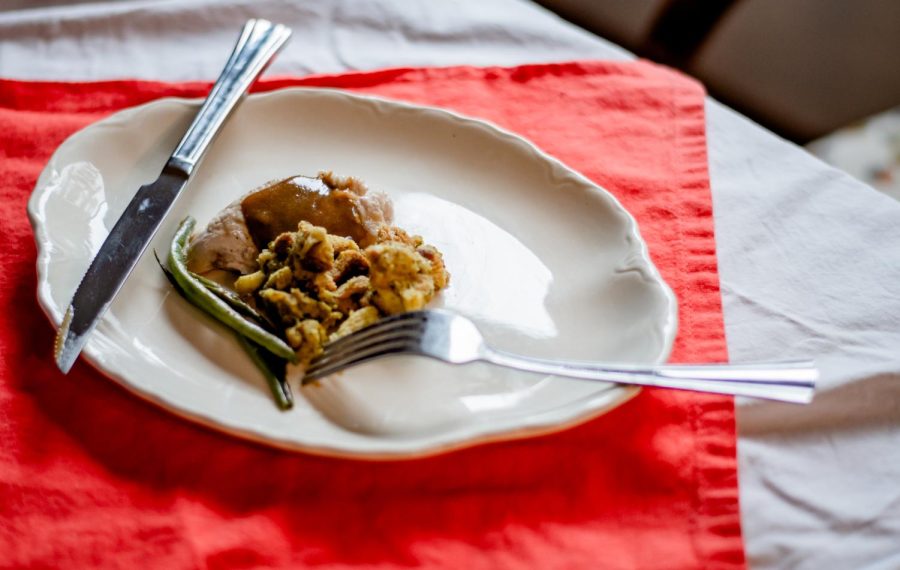Thanksgiving Calorie Counting and the Perpetuation of Diet Culture
As October fades to November, images of carved turkeys and assorted casseroles begin to dance in the minds of American people as they anticipate a food-centered holiday. For many, however, this anticipation brings dread instead of joy, as Thanksgiving can be a catalyst for negative food-talk and imposed dietary expectations.
Amy Paine, an empowerment and boudoir photographer who seeks to promote body positivity through her work, discussed practices seen at Thanksgiving that can contribute to negative feelings surrounding body and diet.
“[Thanksgiving can] heighten anxieties around our relationship with food,” Paine said. ”We’re told there’s a difference between good and bad foods and that some hold a higher moral standard than others. We see memes that are fatphobic in reference to eating ‘too much’ at dinner. We feel judgmental gazes from moms, aunts, siblings, et cetera, when we load up our plate for the first time.”
When food is the focal point of a gathering, an association between eating without restrictions and feeling guilty is given a space to flourish. In a Nov. 19 interview with CNBC, psychologist Marshall Beauchamp argued that food-centric holidays like Thanksgiving have the potential to cause setbacks for individuals with eating disorders.
“The National Eating Disorder Association (NEDA) has a lot of great resources, not just for individuals experiencing disordered eating, but also for family and friends so they can learn how to better support individuals who may be experiencing these types of struggles,” Beauchamp said.
Seasonal activities centered around burning off food eaten on Thanksgiving can amplify preexisting insecurities and mental health conditions. Milo Chaffe, a second-year cellular and molecular biology major, finds certain aspects of the holiday more problematic than others.
“I think that the Turkey Trot is on very thin ice,” Chaffe said. “Forcing your family to run a 5k in order to ‘earn’ food is wholly unethical. As for meal skipping to ‘save up’ for Thanksgiving dinner, that’s a recipe for binge eating, discomfort, and furthering disordered habits.”
Anabella Vucci, a second-year public affairs major, echoed the sentiment.
“The Turkey Trot masquerades as a fun event that brings people together,” Vucci said. “But in reality it is a mechanism that people use to mentally and physically earn their food which is indicative of a mindset curated by a culture that shames people for eating or overeating.”
Approximately 30 million Americans have struggled with disordered eating, and Thanksgiving presents increased opportunities for food-related guilt to manifest. As someone who has recovered from an eating disorder, Chaffe has run into some of these challenges.
“I’ve found Thanksgiving to be very hard,” Chaffe said. “Whether it be talking about the latest crash diet or workout plan, discussing weight and body changes of different family members, or making one-off comments that jokingly allude to food being a negative thing rather than something that’s necessary. Triggering topics always come up.”
Paine argues that one way to emphasize the positive elements of Thanksgiving is to focus on familial connections and community rather than food.
“Steer conversations away from body image and stop saying things that make food or fat the ‘bad guy’. Let bodies be bodies, let food be food, let movement be movement all without assigning moral value,” Paine said.
Similar to Paine, Chaffe proposes a focus on one another’s personhood instead of talking about bodies as a means of deemphasizing consumption and reorienting toward interconnectedness.
“Removing the moral judgment behind [food and eating] and just allowing it to ‘be’ creates the safety one needs to cultivate a healthy relationship with food,” Chaffe said. “Putting the focus more on catching up with family, being together, and talking about all of the way more interesting things than the size of your jeans or the food that you’re eating.”
As November fades into December and images of honey-glazed ham and gingerbread cookies begin to supplant those of turkey and stuffing, those who experience body insecurity and eating disorders are left to wonder how the negative effects of Thanksgiving may seep through into the next annual food-filled holiday. It is the responsibility of families celebrating Christmas and other winter holidays to create healthy conversations surrounding food and body image, placing emphasis back onto connectedness and joy, where it belongs.


